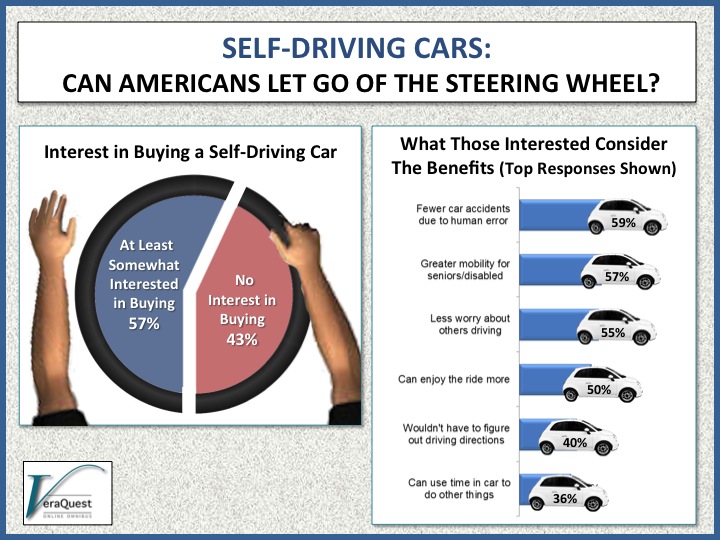The thought of a driverless car is just strange to begin with, but then I think of the technology “glitches” that we deal with every day – for example, how my laptop likes to freeze-up or shut itself down on a whim, and how last weekend my GPS tried to get me to turn the wrong way down a one-way street – and the thought of a computer autonomously driving me to my destination has me more than a little concerned. More concerned, though, than I should be about human drivers? Human drivers have a myriad of distractions (texting, talking on the phone, playing with the radio, etc. etc.) and sometimes make poor decisions, like getting behind the wheel after having too much to drink. Hmmm…

In a recent VeraQuest omnibus survey, we asked 1,512 Americans if they would be interested in buying a self-driving car if they were fully-tested and available, and the majority (57%) show at least some interest in doing so. The remaining 43% indicate they are not interested. Some notable demographic differences emerge:
- Males (61%) are more interested in buying self-driving cars than females (53%).
- Young adults 18-29 years of age (78%) are most interested in buying self-driving cars, and this interest decreases consistently as age increases (68% of 30-39 year olds are interested; 57% of 40-49 year olds; 47% of 50-64 year olds; 33% of those 65+ years of age).
- Midwesterners (51%) are less interested in this technology than those residing in other regions of the country (East = 60%; South = 58%; West = 58%).
- Hispanics (73%) show greater interest in self-driving cars than both Black/African-American respondents (60%) and Caucasians (51%).
Those interested in buying self-driving cars see benefits of fewer car accidents due to human error (59%), greater mobility for older people or people with disabilities (57%), and having less worry about others driving (55%) – others driving too fast/unsafely, driving after drinking, or texting & driving. Half (50%) can simply appreciate being able to enjoy the ride more. When asked what they see as the single biggest benefit, nearly one-third (29%) cite fewer car accidents due to human error.
Those who are not interested in buying self-driving cars reveal concerns about vehicle durability/reliability (68%), which includes concerns about relying on electronics (they can be unreliable/vulnerable), as well as concerns regarding potential mechanical failure/durability of the vehicle. Over half (55%) say that it just feels unsafe. And on a related note, 48% feel that humans being removed from the act of driving feels unsafe (the “human factor” in driving is a good thing, safety-wise). When asked for their single biggest concern about self-driving cars, one-third (34%) reference the vehicle durability/reliability issue.
I do think about older/disabled friends and family members and how liberating it would be for them to not have to rely on others to drive them around, and that aspect is a very positive one in my book. And then to think about the lives that could be saved every year if all cars on the road were self-driving (given that the vast majority of car accidents are caused by human error)…it’s pretty intriguing. I read recently that Google has been testing its self-driving cars for two years now (spanning hundreds of thousands of miles of road testing), and only two of their vehicles have been involved in minor accidents on the road – in one case, a person was actually manually operating the vehicle at the time, and in the other case, the vehicle was rear-ended at a stop sign…by a human-driven car, of course.
Do you find this type of technology exciting or frightening? Would you be more comfortable with a self-driving car that allows a person to take-over the driving as needed/desired, or one that does not allow for a person to take-over?
Leave a Reply